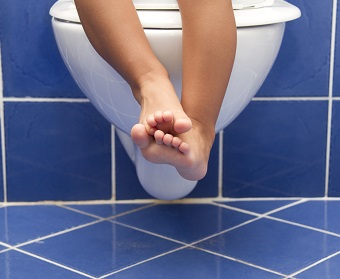|

Submitted by Children's Physician's Medical Group
Many parents worry that their infant or child may be constipated without an understanding of what is normal. What is constipation? Does frequency of stooling matter? What are the factors that affect stooling? When should you seek help?
Constipation is diagnosed when stools are hard and difficult to pass. The frequency of stooling varies from infant to infant, and child to child, and is not as important as how easily stools are passed. Diet, hydration, behavior, environment and changes in routine are all issues that can influence stooling.
In the first few weeks of life, infants should stool at least 1-2 times per day, but can stool up to 12 times per day. After the first few weeks, infants typically stool multiple times a day, but can also go 7 days between stools, and both scenarios are perfectly normal. When would you consider your newborn to be constipated? When they have gone several days in between bowel movements and are uncomfortable, fussy, and passing gas, or they make a small hard stool. As babies grow they typically have fewer, but larger stools, and that goes for toddlers and children as well. As long as your child is having soft easy to pass stools, they can be 3 times a day or every couple days. Passing small, firm, hard to pass stools would be considered constipation.
Many factors affect stooling, but diet and hydration are the most common. Changing from breast milk to formula, too much cow’s milk, or the typical high carb toddler diet can all lead to harder stools. Another big culprit is stool holding. Brought on by fear, stool holding can occur after passing large hard painful stools, or being uncomfortable using a toilet away from home. Unfortunately, both situations create a vicious cycle; fear causes holding and the eventual passage causes pain, which causes more holding. Not only does the constipation continue, but also it becomes worse.
How do you treat constipation? In infants, the usual treatment is 2-4 oz. of diluted prune or pear juice. In older infants you can incorporate higher fiber foods like apricots, plums and prunes. In toddlers and children increase their fluid intake, make sure they are eating high fiber foods like fruits, vegetables and whole grains, and finally cut back on the high dairy, high carb diet. For stool holders you will most likely need a stool softener (you can discuss this with your pediatrician) and some retraining. Have your child sit on the toilet 10-15 minutes after each meal for at least 10 minutes, and use a reward system when they are successful.
You should see your pediatrician if your child has been constipated for a long time, is having pain or blood with bowel movements, or is experiencing generalized abdominal pain.
Finally, be patient, constipation is a chronic problem that will take some time to work its way out! |